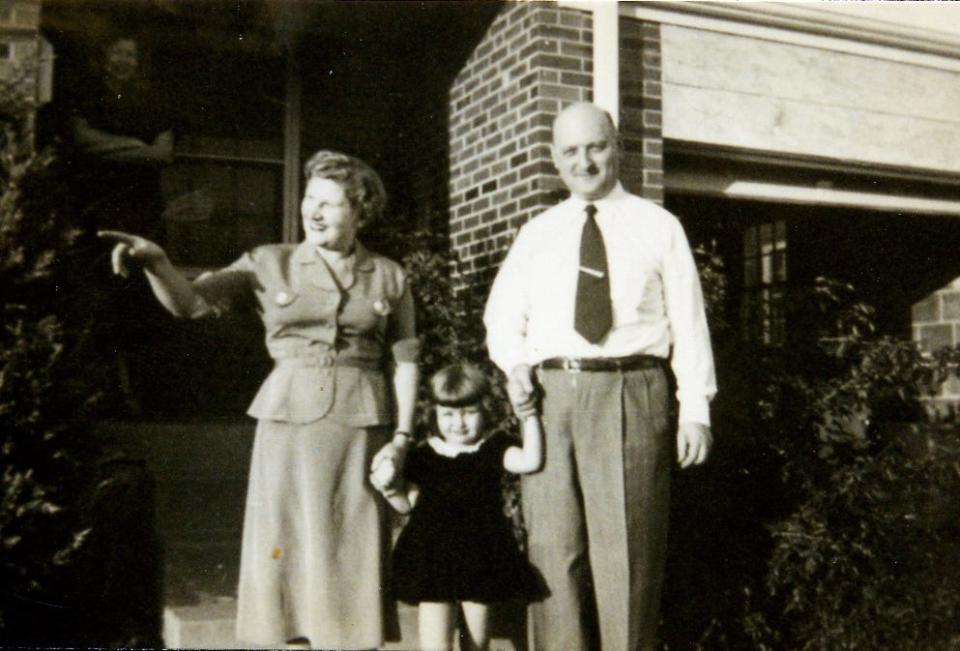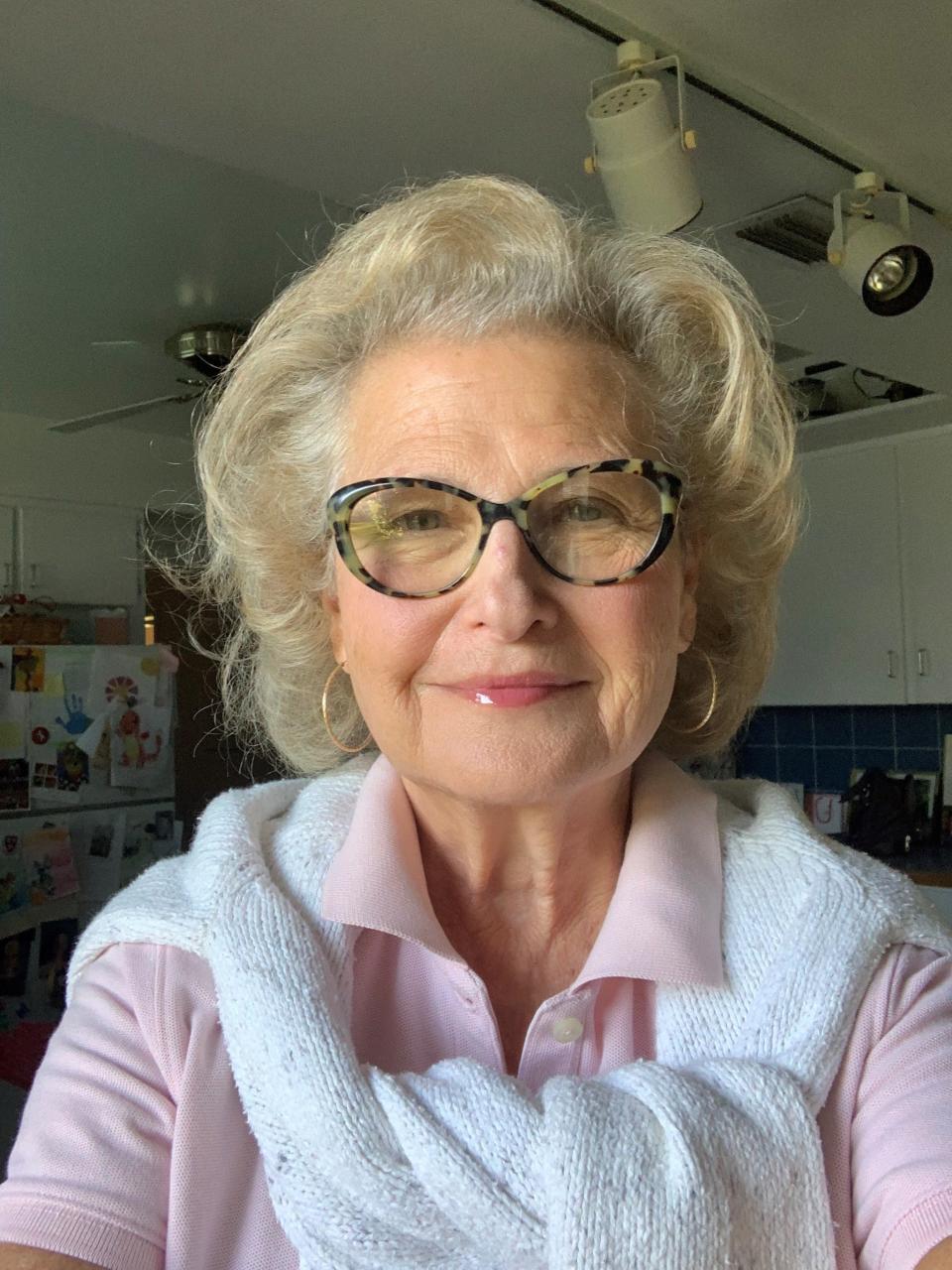Mark Woods: This projection comes from the children of Holocaust survivors
Growing up in St. Louis, Helen Meatte always had a sense her parents were different from her friends' parents.
While some of it was easy to quantify — her parents had “funny accents” — some of it was harder to define and maybe only truly understood decades later when Meatte, after retiring as an art and history teacher at The Bolles School, joined a writer’s workshop for the children of Holocaust survivors.
“They were also very different in terms of their fragility, especially my mother,” she said.
Leo Merin and Lea Ryba both managed to escape Europe, make it to America, meet each other and start a new life.
That’s the trite expression we often use to describe what immigrants in general do, what Holocaust survivors in particular do. Start a new life.
Antisemitism in Jacksonville:Reaction to hate can't be superficial and fleeting, like a projection on a wall | Mark Woods
Banner flies over Jaguars stadium:Lawyer behind flyover has long history, from Aryan Nations to Confederate monuments
Looking back on WWII:With diary revealed, Jacksonville woman tells of reticent father's life as a POW in Germany
But starting a new life doesn’t mean the old one instantly ends. In many ways, both intentional and unintentional, it lingers for generations.

What was it like to grow up as a child of Holocaust survivors? How were “second-generation survivors” affected by what their parents lived through? What should we all take from this today?
When Stacey Goldring started a writer’s workshop in 2013, those were the core questions. In the last 10 years, they’ve only become more timely.
On Saturday evening — two weeks after a giant swastika and cross were projected onto a downtown building in Jacksonville — a documentary film produced by Goldring will be shown at FSCJ-South Campus in commemoration of UN Holocaust Remembrance Day.
“Traces, Voices of the Second Generation” follows 19 children of Holocaust survivors telling not only their parents’ stories — stories those parents often were reluctant to share — but also explaining how one of history’s darkest chapters affected the “second-generation survivors.”
Helen Meatte, now 73, is one of those 19.
The 'lucky' ones
Her father, Leo, was from Hanover, Germany. In 1939, he owned a candy shop there.
But he decided to leave that business and flee the country not long after Kristallnacht, the two days in 1938 of violence and destruction of Jewish-owned businesses, synagogues and homes that left streets littered with shattered glass.
“My father came to the decision that he didn’t have a future there,” Meatte said. “He was one of the lucky ones. And I use quotation marks on the word ‘lucky.’”
At the time, the United States had strict quotas on how many Jews it was allowing to enter the country. Signing the 1924 Immigration Restriction Act, President Calvin Coolidge had said, “America must remain American.” In 1939, more than 300,000 Germans applied for U.S. visas and about 20,000 were approved.
But her father’s parents wrote to a relative in Chicago who was able to sponsor him. He arrived in New York City and got a job as a pattern cutter in the garment district. One year to the date after his arrival, he was drafted into the Army.
He would say it was one of the best things that ever happened to him. In the middle of the Depression, he had a roof over his head and three meals a day. He learned English. And when he got out of the Army, he was eligible for the G.I. Bill, received a low-interest loan and started a business in St. Louis, a lady’s ready-to-wear shop.

“So he loved America,” Meatte said. “I couldn’t say anything negative about the United States in front of him. He wasn’t going to hear it.”
When he left Germany, he left his parents and three siblings, two brothers and a sister. One of his brothers escaped to the Netherlands, and successfully avoided the Nazis. But both of his parents and his other two siblings ended up in Auschwitz. Only his sister — Meatte’s aunt — managed to survive.
“She spoke multiple languages and that probably saved her life,” Meatte said.
She was out in a field, dumping human waste, when she heard an officer say they needed the numbers — not the names, the numbers — of anyone who had secretarial skills and could speak German. She could do both. So she was able to move from the typical barracks, places with such unsanitary conditions that many prisoners died from disease, to something slightly better.
After also surviving the winter “death march” to Ravensbruck, she ended up in a displaced persons camp. That’s where she met Lea — the woman whom, after they both ended up in the United States, she introduced to her brother. Leo and Lea had two children, Helen and Seymour.
'Passing' as Christian
Helen’s mother had her own Holocaust survival story. She grew up in a small town in Poland and had been married to a young man from that village. As the Germans invaded Poland, he was conscripted. Before heading to the frontlines and being killed, he had the foresight to use Lea’s appearance — she was blonde and blue-eyed — to help obtain false papers. Instead of identifying her as Jewish, the papers said she was Christian.
She ended up working in factories, passing as Christian throughout the war.
“I have to assume that my mother lived every day in fear that her true identity would be revealed,” Meatte said.
She has to assume this partly because her mother died when she was 12, and partly because her parents and her aunt — the one who introduced her parents — never talked about their experiences.
Meatte tried to get her aunt to talk to her about it, but couldn’t get her to open up. So she feels fortunate that someone eventually was able to — Steven Spielberg.
In 1994, a year after “Schindler’s List,” Spielberg established the USC Shoah Foundation, a nonprofit dedicated to recording interviews with survivors and witnesses of the Holocaust (in Hebrew, the Shoah). One of those interviewed: Meatte's aunt.
“I think there are five tapes of her being interviewed,” she said. “So I know her story through those tapes.”
![Writer and filmmaker Stacey Goldring, founder of Searching for Identity Foundation Inc. [Provided by OneJax Institute]](https://s.yimg.com/ny/api/res/1.2/5l2RfUFnLXCpVvOkcKM5Kg--/YXBwaWQ9aGlnaGxhbmRlcjt3PTQyMDtoPTQxOQ--/https://media.zenfs.com/en/the-florida-times-union/68e907b0bc413819749aa29257a9a9f3)
And while her parents named her Helen Fay after the grandmothers who died in the Holocaust — Chaya (her mother’s mother) and Feigle (her father’s mother) — she and her brother grew up knowing little of their stories.
When Meatte joined the writer’s workshop for second-generation survivors, she found quite a few common threads, starting with a lack of details about their own parents' lives — often followed by a sense that it was their role to fill those gaps in their parents' lives.
Ken Wald’s parents both grew up in small towns in Germany, survived the Holocaust, met in the United States and ended up starting a new life in Nebraska. Wald, a professor emeritus of political science at the University of Florida, is among those featured in “Traces.”
“Our parents didn't want us to be afraid, so they really kept most of it to themselves,” Wald said. “That’s not the case for everybody. But most of us really didn't grow up knowing a lot. So we've all come together to try to figure it out and get a better feel for what had happened to them. And I do think that helps us to better understand our parents and to respect what they managed to accomplish.”
He says that one of the lessons of this project is that trauma is something that lasts a long time.
“The people who experienced it directly, of course, have memories of it and emotional reactions,” he said. “But in many cases, those are inadvertently passed on to the children.”
One of the many examples, something that Meatte sees more clearly after trying to put her stories into words: Her parents so desperately wanted her to have an idyllic childhood that it put unintended pressure on her.
“It was always unspoken, but I felt an obligation to always live this perfect existence,” she said. “I would never share anything that might have been disappointing or painful with my parents, because I knew that would be bad for them, it would break them. Because they wanted my life to be the opposite of what they experienced.”
At this point in her life — she has two grown children and four grandchildren — it isn’t just a matter of passing along stories from the Holocaust. And “Traces” isn’t just about giving voice to the children of Holocaust survivors. It’s about preventing history from repeating itself.
That’s another one of those expressions that's used so frequently that it tends to lose its impact. Like starting a new life.
But in recent years, Meatte has become increasingly wary of the echoes of history repeating itself.
She and other second-generation survivors have seen protesters at the “Unite the Right” rally in Charlottesville break into chants of “Jews will not replace us.” They’ve seen the news that a gunman, after posting an angry screed about a Pittsburgh synagogue’s support of modern-day immigrants, killed and wounded more than a dozen people there, some whom had survived the Holocaust. They’ve seen a rise in very public displays of hate, including just two weeks ago a swastika and cross projected onto the side of a building in Jacksonville.
So with all of that in mind, they hope people will see this film.
Goldring, the film’s producer, said: “I invite our community and city leaders to attend, hear these stories, and recognize that like the children and grandchildren of survivors, we all have a responsibility to educate and ensure these stories are remembered.”
mwoods@jacksonville.com
(904) 359-4212
'Traces' premiere
What: "Traces, Voices of the Second Generation," a documentary that tells the stories of children of Holocaust survivors.
When: 7:30 p.m., Saturday, Jan. 28
Where: Wilson Center of the Arts, FSCJ-South Campus, 11901 Beach Boulevard, Jacksonville
Cost: free, but reservations are requested and donations appreciated
More information: www.searchingforidentity.org/traces
This article originally appeared on Florida Times-Union: Documentary on children of Holocaust survivors debuts in Jacksonville

